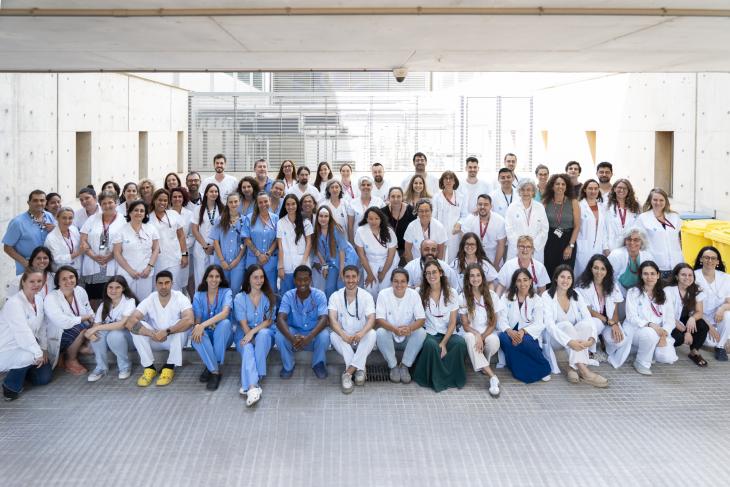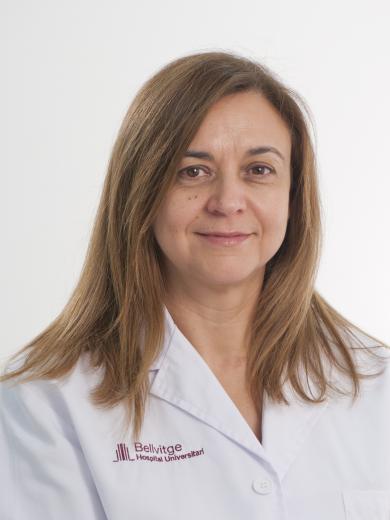
The Pharmacy Department (PD) is a central clinical support service that has its own activities and that provides support for the other Hospital departments. It aims to ensure comprehensive, efficient pharmacotherapy throughout the patient healthcare process.
The major strategic lines describing the current outlook of the hospital pharmacy are as follows: incorporation of new technologies into the pharmacotherapy processes; continuous improvement in terms of safety; continuous pharmacotherapy monitoring of patients; involvement of the hospital pharmacist in optimising personalised pharmacotherapy, applying the principles of evidence-based medicine and promoting the areas of research and innovation with regards to medicinal products.

The Pharmacy Service has achived the ISO 9001 certification, an international standard that attests his excellence in quality management. This certification reflects the service's commitment to continuous improvement, process safety, and client's satisfaction. ISO 9001 guarantees that the Pharmacy Service's procedures meet the most demanding quality requirements, ensuring efficient and transparent management of medications and resources.
Access to the Pharmacy Service's quality policy here.
Staff
Head of Service
Cap de Servei

Head of Section
Facultatius/ves especialistes
Facultatius/ves especialistes
Emerit Specialist doctor
Emeritus doctor
Head of Nursing Area
Cap d'Àrea Infermera
Technicians coordinator
Coordinadora de tècnics
Assistant pharmacists
Farmacèutic/a de suport
Farmacèutic/a de suport
Farmacèutic/a de suport
Farmacèutic/a de suport
Specialist Doctors
Facultatiu/iva especialista
Facultatiu/iva especialista
Facultatius/ves especialistes
Facultatius/ves especialistes
Facultatius/ves especialistes
Specialist Doctors
Specialist Doctors
Specialist Doctors
Facultatius/ves especialistes
Specialist Doctors
Specialist Doctors
Facultatius/ves especialistes
Specialist Doctors
Facultatius/ves especialistes
Specialist Doctors
Specialist Doctors
Research support
Specialist Doctors
Facultatius/ves especialistes
Suport a la recerca
Relevant aspects
Hospitalisation: pharmacotherapy monitoring
- Each pharmacist reviews and validates the electronic prescriptions (PEA) of hospitalised patients in the departments for which his/she is responsible. Validation involves reviewing the suitability of all the medicinal products prescribed. More specifically, the indication, the dosage, the method of administration, the interactions, and analytical data are reviewed and, where deemed appropriate, recommendations as to the treatment and/or advice on adjusting the dosage are given.
- The Pharmacy Department is involved in the Antibiotic Optimisation Programmes (PROA) along with the infectious diseases and clinical microbiology departments and those specifically involved, such as intensive medicine and the surgical departments.
- The Pharmacy Department currently monitors 100% of all intra-hospital electronic prescriptions during the working hours of 8-22h.
Outpatients
- Hospital outpatient medication dispensing system:
- The electronic prescriptions of outpatient patients are validated, compliance with therapy is monitored, and spoken and written information is provided on the administering and adverse effects of medicinal products.
- Main medication programmes:
- Antiretroviral, selective immunosuppressants, medicinal products used to treat HBV, HCV, multiple sclerosis, kidney failure, metabolopathies, pulmonary hypertension, foreign drugs, and all other medications that must be dispensed from hospital.
- Patient information:
- Notice to users of the Pharmacy Department outpatient medication dispensing system Advice for the correct use of medicinal products Collection of medicinal products by an authorised person Collection of medicinal products by an authorised person Collection of medicinal products by a courier Collection of medicinal products by a courie
- Coordination with primary care:
- Daily validation of the external prescription and its analysis. Working together to implement the primary care prescription and on meeting the annual CatSalut/ICS goals described in the pharmaceutical prescription quality standards. In populations of special risk, specific monitoring is provided and permanent care is ensured by reconciling the medication on discharge.
Clinical pharmacokinetics
- The Pharmacy Departments makes recommendations for personalised dosage, based on the monitoring of plasma concentrations and depending on the pathology and clinical response of the patients. The drugs involved in dosage optimisation are:
- Antibiotics: vancomycin, aminoglycosides, beta-lactams
- Anticonvulsants: phenytoin, phenobarbital, carbamazepine, lamotrigine, valproate, topiramate, levetiracetam, lacosamide, eslicarbazepine, perampanel and zonisamide
- Digoxin
- Selective immunosuppressants: infliximab, adalimumab and anti-drug antibodies.
Technical area: compounded formulas and preparation of sterile compounds
- Compounded formulas:
- Mostly for hospitalised patients.
- In certain pathologies, these formulas are prepared for outpatient patients, following the processing and approval of the corresponding requests.
Increased safety of the medicinal product by preparing sterile intravenous compounds with specific requirements Full, individual identification of solid oral medication (repackaging of medication) to guarantee safety when administered.
Medication management
- Procurement: medication purchasing management in line with current regulations.
- Logistics: the PD is responsible for establishing the appropriate circuits to ensure the correct supply of drugs to the Hospital. The medicinal products are distributed to hospitalised patients using the unit-dose distribution system (UDDS) every 24 hours with changes every 2h for certain units, the automated dispensing systems (critical care, emergency and short-stay units), the traditional stock replenishment system and the special distribution systems (certain drugs).
- Expenditure analysis: a report is produced on the evolution of expenditure in medicinal products at the HUB arising from prescriptions for hospitalised patients (hospital expenditure) and patients included in hospital outpatient medication dispensing programmes (outpatient expenditure) on a monthly and yearly basis.
Clinical nutrition
- Formulating and preparation of parenteral nutrition bags in hospitalised and home-care patients
- Design of the composition adapted to the requirements and clinical situation of each patient.
- Safe, computerised and fully robotic preparation of the process.
- Minimised risk of catheter infection, packaging the bags produced in optimal conditions to ensure they remain sterile.
- Monitoring of correct administration, recording and focusing on any associated complications. The home parenteral nutrition programme includes:
- Healthcare education for patients at the start of the therapy.
- Monitoring and support in specific care to avoid any complications associated to the treatment.
- The clinical nurse caring for patients with PN and advising on the protocol of the care plays a relevant role in this process.
Pharmacotherapy and selection of medication
- Medication information centre: answering any queries made on pharmacotherapy, informing of any news or warnings related to medication on the Department’s intranet and publishing the InfoFAR bulletin every fortnight with a summary of the most relevant news. It takes part in the correct selection and rational use of medication, preparing technical assessment reports on new medication to be consulted during the PTC decision-making process and technical reports on individual cases involving requests for medication in special situations.
- The Hospital Pharmacotherapy Commission (PTC). Coordination of the Hospital Pharmacotherapy Commission (PTC), which is responsible for selecting the medicinal products that can be prescribed within the hospital environment. The following committees are answerable to the PTC.
- Participation of the Pharmacy Department in other advisory commissions at the hospital: parenteral nutrition, infectious diseases, antibiotics, and safety and coordination with primary care.
- Participation of the Pharmacy Department with other advisory commissions of the ICS and CatSalut.
Research
Lines of research
- The protective role of omega-3 fatty acids in hepatic lesions associated to full parenteral nutrition
- The influence of omega-3 fatty acid supplements in inflammatory response in complex high-risk surgical patients
- Populational and individualised pharmacokinetic-pharmacodynamic modelling of biologic doses in intestinal inflammatory diseases and psoriasis
- Populational pharmacokinetic-pharmacodynamic modelling of biologics in patients with rheumatoid arthritis and antimicrobials.
- Application of nanotechnologies to new drug administration systems
Research groups
- Pharmacotherapy, Pharmacogenetics and Pharmaceutical Technology Group. IDIBELL.
- AGAUR Group File number: 2017 SGR 1667. Group name: Research group on Population Pharmacokinetics, Pharmacodynamics and Pharmacogenomics
Main publications
- Llop-Talaveron JM, Badia-Tahull MB, Leiva-Badosa E and Ramon-Torrel JM. Parenteral fish oil and liver function test in hospitalized adult patientes receiving parenteral nutrition: A propensity score-matched analysis.Clinical Nutrition. 2017. 36(4):1082-1088. doi: 10.1016/j.clnu.2016.06.027. IF. 5.496
- Llop-Talaveron JM, Badía-Tahull MB and Leiva-Badosa E. An inflammation-based prognostic score, the C-reactive protein/albumin ratio predicts the morbidity and mortality of patients on parenteral nutrition. Clin Nutr. 2018 Aug 21. pii: S0261-5614(17)30296-0.doi: 10.1016/j.clnu.2017.08.013. (in press). ISSN/ISBN: 02615614. 01-01-2017, vol.: 114 nº: 6. pg: 467 -1120. DOI:10.1016/j.clnu.2017.08.013. Agencias: Scopus; WoS | Factor Impacto: 1.619; 4.548 | Rank: 15/121; 8/86; 9/81 | Quartil: Q1 | Tercil: T1 | Decil: D2 | Percentil: P12; P93. IF. 5.496
- Santacana E, Rodríguez-Alonso L, Padullés A, Guardiola J, Rodríguez-Moranta F, Serra K, Bas J, Morandeira F, Colom H, Padullés N. External evaluation of population pharmacokinetic models of Infliximab in patients with inflammatory bowel disease. Ther Drug Monit 2018; 40(1):120-9. IF. 2092
- Shaw E, Rombauts A, Tubau F, Padullés A, Càmara J, Lozano T, Cobo-Sacristán S, Sabé N, Grau I, Rigo R, Dominguez MA, Carratala J. Clinical outcomes after combination treatment with ceftazidime–avibactam and aztreonam for NDM-1-OXA-48-CTX-M15-producing Klebsiella pneumoniae infection. J Antimicrob Chemother. 2017 Dec 19. doi: 10.1093/jac/dkx496. FI. 5.173
- Lloberas N, Elens L, Llaudó I, Padullés A, van Gelder T, Hesselink DA, Colom H, Andreu F, Torras J, Bestard O, Cruzado JM, Gil-Vernet S, van Schaik R and Grinyó JM. The combination of CYP3A4*22 and CYP3A5*3 SNPs determine tacrolimus dose requirement after kidney transplantation. Pharmacogenetics and Genomics 2017;27(9):313-322. IF. 2.91.
Education
Degree education
- Faculty of Pharmacy and Food Sciences
- Associate Professors:
- Pharmacy Department
- Ramón Jodar. Associate 2+2. Pharmacology Department. Diagonal Sud Campus
- Josep Llop Talaveron. Associate 1+1. Technology Department. Diagonal Sud Campus Enric Sospedra. Associate 4+4. Technology Department. Diagonal Sud Campus
- Pharmacy Department
- Tutored work experience programme
- 14 tutored students, Metropolitana Sud (2 HUB)
- Erasmus programme
- 1 student/year
- Associate Professors:
Master's degrees and accredited courses
- AMS university expert diploma for excellence: from clinical practice to hospital certification. UNED. Professor: Sara Cobo Sacristán.
- Update on the situation of Biosimilars. Exchangeability of indications. Ongoing Training Institute IL3. UB. Professor: Ariadna Padullés Zamora.
- Implementation of antimicrobial use optimisation programmes (PROA). Ongoing Training Institute IL3. UB. Professor: Ariadna Padullés Zamora.
- Introductory course to pharmacotherapy with haemoderivatives. Vall d’Hebron Hospital. UAB. Bellvitge Hospital UB. Professor: Elisabet Leiva Badosa.
- 12th Introductory course to pharmacotherapy with haemoderivatives. On-line course. Vall d’Hebron Hospital. UAB. Bellvitge Hospital UB. Professor: Núria Padullés Zamora
- Patient care in treatment with hospital outpatient dispensed medication. Germans Trias i Pujol Hospital UB. Professor: Núria Padullés Zamora.
- Specialist training (4 years Hospital Pharmacy). There is a 4-year Training Programme in the Hospital Pharmacy Speciality: Total 8 Residents. Two residents per year. Internship programme. Joint management in the yearly introductory course to pharmacotherapy with haemoderivatives
Bellvitge University Hospital Technosurgical Building
c/ Feixa Llarga, sn. | 08907 L’Hospitalet de Llobregat. Barcelona
Floor -1 modules A and B
Outpatient dispensing area:
Technosurgical Building Floor -1 Module B
Dispensing hours: Monday to Thursday from 8 a.m. to 5:30 p.m.; Friday, from 8 am to 3 pm
Contact: 93 260 79 77 weekdays from 8:00 am to 10:00 am and from 12:00 pm to 2:00 pm
citesfarmacia@bellvitgehospital.cat
Provider entrance
Working days from 8 am to 1 pm
Domestic enteral nutrition provision
Working days from 8 am to 3 pm
Technosurgical building Floor -1 Module A
Telephone: 93 260 75 00 Ext 8345
General email: farmacia@bellvitgehospital.cat
Patient care email: atenciofarmaceutica@bellvitgehospital.cat

 Presentation
Presentation Staff
Staff Relevant aspects
Relevant aspects Research
Research Education
Education Location
Location